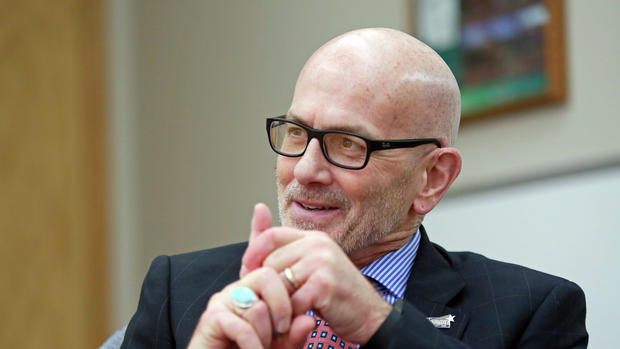Lawyer Says Requested Review of Bismarck Police Officer Petition Signatures Was Concerning, BCI Refused to Do Interviews

Bismarck Mayor Mike Seminary talks about the impact Carson Wentz has made in the city and state of North Dakota. David Samson / The Forum
Earlier this week, in writing about the effort to recall Bismarck Mayor Mike Seminary, I flagged an email City Administrator Keith Hunke sent to a BCI investigator working on verifying the signatures which requested that he specifically interview the eleven Bismarck Police Department Officers who had signed the petition.
Hunke has told me he’s not going to comment on the recall effort earlier, but I ran the situation by Bismarck Attorney Chris Redmann. He’s a former FBI intel analyst, a former Fargo cop, a former Burleigh County prosecutor and, as a part of his private practice, represents law enforcement officers through the Fraternal Order of Police.
Redmann told me the situation is concerning.
“The concern I have is there was obviously some sort of active effort to cull out BPD officers who signed a petition, those officers were then put on a list which was given to their boss (Dan Donlin), and then a senior BCI Investigator—who all those cops respect—is going to ‘talk’ with them and ask, ‘did you actually mean to sign the petition for the recall?'” he told me in an email. “That leads to a chilling effect—an effect of not signing any more petitions in the future.”
He continued:
When Casey [the BCI agent who worked on verifying signatures] goes out to do interviews, each one of those officers will know that the fact they signed the recall petition has made it to their boss and there will undoubtedly be either real or perceived displeasure with their decision to sign the petition by the Department. That’s important because BPD monetary promotions and Department “rankings” happen in what’s referred to in a “war room” proceeding—which of course is unrecorded to my knowledge. Supervisors will literally rank their underlings 1-5 individually, and then each officer gets their “rank” in the department (not literal rank such as “sergeant” but statistical rank such as “121 of xxx”). It’s common knowledge that if the boss isn’t happy with you then you’ll get ranked lower, and if you get ranked lower, you will get a smaller raise or no raise. You may also be ineligible for promotions, assignments, etc. if your rank isn’t high enough. It results in a popularity contest. This sort of system is the equivalent of picking a football team at middle school recess—sure you’ll get some talented guys picked early, but most of the time it’s the team captain’s buddies who get picked first.
As popularity is tied to ranking, and rankings are tied to monetary benefits and promotions, it is obvious that—colloquially—pissing the Chief off is not a good thing. I don’t have much doubt that the officers who found themselves on the Chief’s list and being interviewed because of their signatures feel they angered the brass; and, logically, in the future, only the most defiant would engage in conduct that brings potential loss of income and passed-over promotions. The problem is that in this case, “conduct,” refers to civic engagement of public importance and unrelated to the scope of police officer duties; this is constitutionally protected activity we’re talking about here. Public employees do not sign away their constitutional protections because they work for “the man,” and any real or perceived punishment/negative treatment will certainly deter and/or have a chilling effect on future civic engagement. I would certainly urge any Bismarck Police Officer who feels they are being officially or unofficially reprimanded for signing any petition—or engaging in any civic activity—to reach out to an attorney.
Meanwhile, I can also report that the BCI turned down Hunke’s request to interview the police officers who signed the petition. An email to Hunke from BCI Supervisory Special Agent Tim Erickson, sent the same day as Hunke’s original request, said the interviews would fall outside of the BCI’s role in verifying the signatures.
I wonder if the BCI had the same concerns about the chilling effects of such interviews as Redman has.
Here’s Erickson’s email:
[scribd id=349332695 key=key-DvrlNy9nGnsc8h5Oplng mode=scroll]




